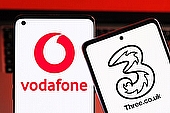Home > Mobile > News > Three throttle mobile broadband connections
Three throttle mobile broadband connections
On Monday Three became the UK's first mobile broadband provider to impose traffic shaping.
Peer to peer (P2P) users on the network are now slowed down to prioritise email and web browsing, a practice common among home broadband providers.

Priorities
"In busy areas, at busy times customers using mobile broadband can experience a slower service.
"We're taking steps that improve the web browsing, email and streaming experience on our network by making sure that the real-time experience gets the priority it deserves," a Three spokesperson told ZDNet UK last week.
It's exactly the same reason home broadband ISPs have given for imposing traffic management systems since the dawn of broadband history but Three are the very first network to take these ideas over to mobile broadband where slow speeds and small data allowances seem disincentive enough for heavy use.
It's unclear at the moment just how many people are using P2P services on mobile broadband but it seems unlikely that they'd make up a large proportion of users.
For that reason it's telling that, according to The Register, the original plan was to also throttle the connection of those in very busy areas such as city centres, airports and train stations.
Three changed their plans to affect just P2P users at the last minute, the tech site said, but it's interesting that the network was looking to solve the problem of busy areas which has long hung heavy on 3G networks.
Throttling
Three's throttling is just what it sounds like: a big restriction on a connection that puts it into the slow lane.
In that sense broadband traffic shaping, as we explain more here, is just an artificial version of the way connections start going hideously slowly around 6pm when everyone gets home from work.
Ultimately even the most notable throttling, such as that imposed through strict policies on downloads, are likely to help more broadband users than they hurt.
Will others follow suit?
At the moment it seems unlikely that other networks will follow Three's lead.
As we noted above, no other mobile broadband network currently imposes traffic shaping on their users.
Technologically advanced mobile broadband users could just shift to getting their content from Usenet groups and file hosting sites such as Rapidshare anyway.
In addition, any self respecting tech-head will most likely have a fast home broadband connection anyway or, at least, one that'll be faster and cheaper per GB than 3G.
The price of a GB on a mobile network is far higher than the same amount of data with a home broadband connection and there have been numerous cases of 'bill shock', unexpected broadband bills for hundreds or thousands of pounds, after unsuspecting P2P users let their software run free.
Finally, mobile broadband hasn't quite taken off as the tech mystic megs expected; it almost seems as if Three are shooting themselves in the foot by drafting in harsh penalties for heavy users.
As difficult as supplying busy areas is, a positive approach - supplying other services such as wi-fi (like these networks), for example - might be more effective than the negative 'throttling' approach which could just scare users away from mobile broadband use altogether.

We are independent of all of the products and services we compare.

We order our comparison tables by price or feature and never by referral revenue.

We donate at least 5% of our profits to charity, and we aim to be climate positive.
Latest News

19 December 2025
Ofcom investigates BT and Three after mobile call outages
19 December 2025
VodafoneThree brings 400 customer service jobs back to the UK
8 November 2025
Vodafone and Three UK to hike mid-contract price increasesGet insider tips and the latest offers in our newsletter


